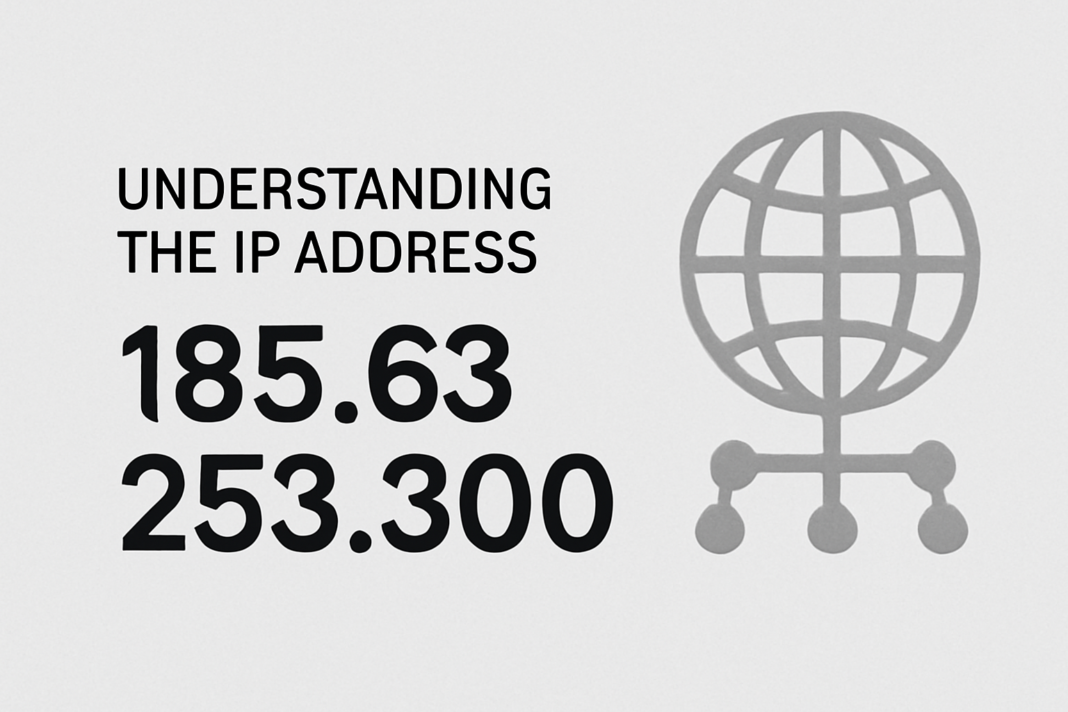When it comes to the world of the internet, you’ve probably heard a lot about IP addresses. But have you ever come across the one labeled as 185.63.253.300? While IP addresses may seem complicated at first glance, understanding them can help you navigate the online world more smoothly. This blog post breaks down what 185.63.253.300 is and what you should know about it, all in simple, easy-to-understand language.
What Is an IP Address?
Before we dive into the specifics of 185.63.253.300, let’s quickly go over what an IP address is. An IP address (Internet Protocol address) is a unique string of numbers that identifies a device on the internet or a local network. Think of it as a street address for your device, like your laptop or smartphone, so that it can be located and communicate with other devices.
The Problem with 185.63.253.300
Now, let’s talk about the IP address 185.63.253.300 specifically. At first glance, it might look like just another regular IP address, but it’s not. If you look closely, there’s a problem with this one—it’s not valid.
An IP address is made up of four sets of numbers, each ranging from 0 to 255. This format is called IPv4 (Internet Protocol version 4). The numbers in the address 185.63.253.300 don’t follow that rule because the last number, 300, is too high. The highest number you can have in an IPv4 address is 255. So, 185.63.253.300 doesn’t exist in the official IP address system.
Why Does This Matter?
You may wonder, “Why should I care about a seemingly invalid IP address?” Well, understanding this kind of information can help you troubleshoot issues when you see strange or incorrect addresses while browsing or working online.
- Error in Networking: If you’re an administrator trying to configure your network or troubleshoot connection issues, an invalid IP address could signal a problem in the system. A mistyped or incorrectly formatted address can lead to network failures or other issues.
- Security Concerns: Sometimes, people come across invalid or suspicious IP addresses while reviewing their server logs. An unusual IP might not be malicious, but it’s always good to verify whether it’s something that should be blocked or flagged for monitoring.
How Are IP Addresses Assigned?
So, what would an IP address like 185.63.253.300 look like if it were valid? Understanding how IP addresses are assigned can shed some light on this.
IP addresses are given out by organizations called Internet Service Providers (ISPs). These ISPs manage the addresses and allocate them to individual users or devices. When you connect to the internet, your ISP assigns you an IP address. However, not all IP addresses are public, and some may be private, meaning they are used within local networks but aren’t visible on the internet.
When a device is assigned an IP address, it becomes part of the larger “internet address pool.” This pool is divided into different blocks, with specific address ranges used for private networks (such as your home Wi-Fi network) and others for public access on the internet.
Can I Use This Address?
You can’t use 185.63.253.300, but let’s take a step back and consider the bigger picture. When it comes to IP addresses, you typically don’t need to worry about choosing one unless you’re working in an IT or networking field.
- Public vs. Private IPs: If you need an IP address for your device, it’s generally assigned automatically by your ISP, and you don’t have to choose it yourself.
- Static vs. Dynamic IPs: Most people are given dynamic IP addresses that change every time you connect to the internet. Static IPs, on the other hand, remain the same. Both have their uses in business and network settings.
What To Do If You Encounter Invalid IPs
If you ever come across an invalid IP address like 185.63.253.300, the first thing to do is check if the numbers are entered correctly. It’s easy to make a typo, and even one wrong digit can make the address invalid. If you’re troubleshooting a network issue, checking the format of the IP address should be one of the first steps.
In cases where you think the address might be trying to mask itself or cause problems, it’s important to use security tools to block or flag suspicious addresses. Cybersecurity software can often detect abnormal or malicious IP addresses that could be involved in online attacks.
Conclusion: Why Understanding IPs Is Helpful
While 185.63.253.300 may not be a valid IP address, it serves as a reminder that even small errors, like a typo, can create big problems in the world of networking. Being familiar with IP addresses, understanding their formats, and knowing how to spot errors can make navigating the internet a lot easier and help you troubleshoot issues when they arise.
Remember, most of the time, your ISP or network provider will handle IP address assignment for you. But having a basic understanding of how they work will make you more aware of what’s happening when things don’t go as planned.
By keeping these points in mind, you’ll feel more confident when dealing with IP addresses and related networking issues, ensuring smoother and safer online experiences.



